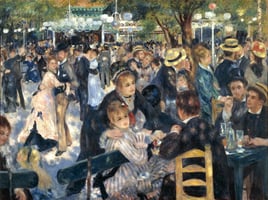How does drawing help children express their ideas? Art has long been included in the elementary...
What evidence suggests that art experiences can lead to higher-order thinking skills?
Art is a powerful tool that can be used to support and promote cognitive development and cognitive skills in children. Research has demonstrated the ability of art activities to improve higher-order thinking skills such as problem-solving, concept formation, and abstract reasoning.
Additionally, studies have shown that art experiences can lead to enhanced spatial skills and an increased understanding of concepts such as space, order, and class. Furthermore, art education has been found to have a positive influence on civic engagement, as it can inspire users to engage with their personal environment. All of these findings suggest that learning art can affect cognitive development and cognitive skills.
However, more research is needed to assess the extent of these effects and how they can be utilized to improve educational outcomes.
What are the positive effects of art experiences on cognitive development and cognitive skills?
Learning art can affect cognitive development and cognitive skills.
Louis 1984 found that art experiences are linked to a child's cognitive development and that visual arts can be used as a tool to teach higher-level thinking skills such as problem-solving, concept formation, and abstract reasoning.
Baker and Smilan 1996 also found that art experiences can influence cognitive development, and that the effects of art experiences on cognitive development can be seen in both verbal and nonverbal reasoning skills.
Additionally, Thomas and Wheeler 1983 found that the children in the study showed a significant increase in their spatial skills after participating in art classes, and Silver 1977 found that the children in the study showed significant gains in concepts of space, order, and class after 10 weekly one-hour art periods.
Furthermore, Han and Kim 2011 studied the effects of art education on civic engagement, and they found that art education can inspire civic engagement in the classroom and that aspects in the users' personal environment, such as meaning, experience, skills, preferences and actions, significantly influence their information-seeking behaviour, respectively.
These findings are not directly relevant to the research question, but they suggest positive outcomes of learning art. Therefore, these papers provide evidence that learning art can affect cognitive development and cognitive skills.
However, more research is needed to determine the extent of these effects and how they can be used to improve educational outcomes.
To what extent can art be used to improve educational outcomes?
In conclusion, the research presented in this paper suggests that art can be an effective tool to support and promote cognitive development and cognitive skills in children.
Studies have shown that art experiences can lead to higher-order thinking skills, increased understanding of space, order, and class, and improved civic engagement. These findings suggest that art can be a powerful tool to improve educational outcomes. However, more research is needed to understand the full extent of the effects of art on cognitive development and cognitive skills, and how these effects can be utilized in the classroom.




